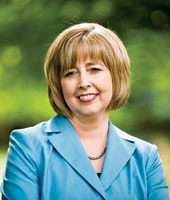Hope and Response
 Why devote an entire issue of a magazine to the subject of “hope”? Someone I recently met asked me that question, prompting one of those rare, personal conversations with a virtual stranger about the
Christian faith, hope and hopelessness in people’s lives, the future of our world — and, incidentally, the purpose of a university magazine. Why devote an entire issue of a magazine to the subject of “hope”? Someone I recently met asked me that question, prompting one of those rare, personal conversations with a virtual stranger about the
Christian faith, hope and hopelessness in people’s lives, the future of our world — and, incidentally, the purpose of a university magazine.
Answering the question required an explanation of what we — Seattle Pacific University and Response — mean by “hope.” Is hope the optimist’s answer to excruciating realities such as war, poverty, and personal pain? Is it merely wishful thinking that things will turn out all right? If so, I would have a difficult time explaining 30 pages of hope-related articles.
But optimism and wishful thinking are
not the kind of hope that theologian Jürgen Moltmann, Seattle Pacific’s guest for the 2007–08 Day of Common Learning, talks about. Nor are they the kind of hope explored by SPU artist Laura Lasworth, psychologist Lynette Bikos, economist Lisa Donegan,
fiction writer Jeffrey Overstreet, literary scholar Susan VanZanten Gallagher, and many others in this special print and online edition of the magazine. The hope they point to is the “living hope through the resurrection of Jesus Christ” (1 Peter 1:3). It is the assurance that because of Christ’s sacrifice on our behalf, the world’s struggle and pain are not the end of the story. It is the conviction that in Christ, our lives, however broken, have meaning in the here and now, and that God will make all things right in the future. This hope is at the heart of the gospel, and at the heart of the life and work of Seattle Pacific University — and thus a rich field of inquiry.
The reason for devoting an issue of Response to Christian hope also reflects the vision of this magazine. Is Response only a university newsletter, or can it serve an even higher purpose? I believe it can and should, I explained
to my new acquaintance.
When Seattle Pacific sets aside a day each year for “common learning,” classes are suspended, and students, faculty, and staff gather to explore an idea of importance to the
University and its mission to engage the
culture and change the world. Guests such as Moltmann, Stephen Carter, John Perkins, Christian Smith, and Joel Carpenter have led the campus in discussions on hope, integrity, reconciliation, teenage spirituality, and globalization. Workshops hosted by faculty and students then apply the lenses of various academic disciplines, and the result is a wide-ranging dialogue that includes the entire community.
The goal of Response is similar: to extend the considerable learning resources of Seattle Pacific to the greater Christian community, including SPU alumni, parents, church leaders, and subscribers around the world who share our interest in faith, ideas, and cultural engagement. Just as Seattle Pacific is about the business of equipping students to become agents for positive change, Response aims to encourage and equip its readers as they influence their communities for good.
That is our passion — and a great conversation starter.

JENNIFER JOHNSON GILNETT
|